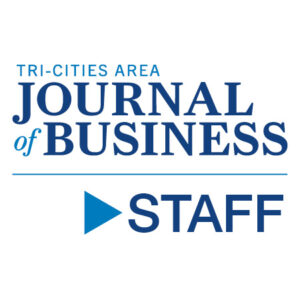
Home » Real Estate & Construction Briefs – April 2024
Real Estate & Construction Briefs – April 2024

April 15, 2024
EWU readies for next step in $110 million renovation
Construction is expected to wrap up in April on the first phase of a two-phase, $110 million renovation of Eastern Washington University’s 148,000-square-foot science building.
Kris Jeske, director of construction and planning at EWU, told the Spokane Journal of Business that contractor bids will be opened for contractor selection in May for the second phase of renovations, and work likely will begin in June.
First-phase renovations include complete interior upgrades of half of the building’s technology, equipment, furnishings, lab spaces, mechanical and electrical equipment, windows and lighting.
The second phase will mirror the first for the remaining half of the 45-year-old building, Jeske said.
Spokane-based Integrus Architecture PS designed both phases of the science building. Leone & Keeble Inc. of Spokane is the contractor on the first phase of the project.
The science building is at 1175 Washington, near the center of EWU’s Cheney campus, next to the 101,300-square-foot Interdisciplinary Science Center that was completed in late 2020.
Separately, EWU is planning a $9.9 million Sports and Recreation Center energy upgrade, at 1007 Elm. Design plans will begin by this summer for the sports center.
Senske Services acquires Kansas City firm
Kennewick-based Senske Services expanded its presence in the Kansas City area with the acquisition of Weber Lawn Care.
The business was established in 1996 by owner Troy Weber, who plans to retire. Pro Turf & Pro Pest Solutions, a brand within the Senske family of companies, will now serve Weber’s customers.
The deal represents the second acquisition for Senske in the Midwest and the third overall in 2024.
Since securing investments from private equity firm GTCR, Senske Services has added 11 brands to its portfolio, and, in addition to Canada, serves customers in 14 states across the U.S.
Home 2 Suites hotel planned for Pasco
Taran Patel of A-1 Hospitality Group recently submitted plans to build a new Home2 Suites by Hilton hotel in Pasco.
Plans filed for Washington’s environmental review process indicate the hotel would have 61,500 square feet of space and be four stories tall. The proposed hotel would feature 107 rooms, with 156 parking stalls and six semi-truck parking stalls.
The project site is south of Earhart Drive and north of West Argent Road, about 550 feet from the intersection of West Argent Road and North 20th Avenue.
The city of Pasco has said the project does not have a probable significant adverse impact on the environment so an environmental impact statement is not required.
Popeyes may be coming to Richland
Chicken lovers, take notice: a Popeyes restaurant may be coming to Richland.
Paperwork has been filed under the State Environmental Policy Act, or SEPA, for a 2,333-square-foot restaurant at 3160 Duportail St.
The fast-food restaurant would sit on what’s now a roughly 1-acre undeveloped parcel between Yakima Federal Savings and Loan Association and a building that’s home to Tri-City Orthodontics, Columbia Point Eyecare and more.
The land is owned by the Vancouver, Washington-based Ambrosia QSR Chicken, LLC.
Popeyes Louisiana Chicken couldn’t immediately be reached about its Richland plans.
Two other Popeyes currently are operating in the Tri-Cities, including at 5814 N. Road 68 in Pasco and 240 N. Ely St., Kennewick.
Popeyes features a New Orleans style menu that includes spicy chicken, chicken tenders, fried shrimp and more.
Tri-Cities native named president of state Realtors group
Jeff Smart is the new president of Washington Realtors.
The Kennewick-based designated broker/owner was elected to the post earlier this year. He’ll direct the group’s executive committee, formulate goals that align with its strategic plan and serve as the primary spokesman.
“His leadership is set to foster collaboration, drive strategic initiatives and ensure that the association’s voice is heard clearly across the state and beyond,” according to a statement announcing his presidency.
Smart said he’s honored to be chosen for the post.
“Together, we will navigate the complexities of the real estate market with innovative strategies and a commitment to our members’ success. Our goal is not just to anticipate the future of real estate but to actively shape it for the betterment of our community and industry,” he said in the statement through the Tri City Association of Realtors.
Smart, of HomeSmart Elite Brokers, is a Tri-Cities native and a second-generation Realtor. His father started the brokerage he runs today.
Richland to roll out all-digital permitting process in June
Richland is moving to an all-digital permitting process beginning June 3.
The self-service portal will allow applicants to apply for building permits, planning applications and right-of-way permits online.
The city’s new permit management software system is designed to help improve efficiency, provide greater transparency into city processes, and deliver better customer service.
During the transition period, from May 28-31, there will be a temporary closure of the permitting office as the city integrates the new system. This closure means no permits or inspections will be processed during this time frame.
Once live, customers can use the portal to check the status of reviews, submit corrections, receive review comments, receive permit documents and approved plans, pay fees and schedule inspections.
Richland renewable natural gas facility powers up
City officials in Richland celebrated a significant environmental milestone on April 2 as they welcomed representatives from Pine Creek RNG (Renewable Natural Gas), Cascade Natural Gas and Lamb Weston to commemorate the opening of the Horn Rapids Landfill Renewable Natural Gas Facility.
Renewable natural gas, a sustainable energy source, is generated from waste materials that would otherwise emit harmful methane into the atmosphere during decomposition. Landfills, wastewater treatment plants, and food waste are among the primary sources contributing to its production.
Denver-based Pine Creek RNG, in collaboration with Avista, a Spokane-based energy company, spearheaded two RNG initiatives in Richland.
The recent project at the Horn Rapids Landfill and another facility at Lamb Weston’s potato processing plant promise to yield about 2.5 million therms of renewable natural gas annually, or enough to power about 3,800 homes, according to the city.
The produced and processed gas will be integrated into Cascade Natural Gas’s local distribution network, marking a shift from previous practices where methane emissions were simply flared, contributing to environmental degradation.
Latest News Real Estate & Construction Business Briefs Local News
KEYWORDS April 2024





